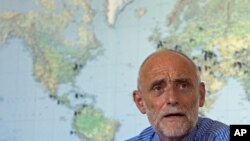The International Committee of the Red Cross says it is forced to cut its budget this year, despite mounting crises and increased humanitarian needs. The ICRC reports donors are giving less because of economic pressures, so it will have to slash more than $90 million from its humanitarian activities, bringing the budget down to less than $1.1 billion.
Last year, the International Committee of the Red Cross spent an all-time high of more than $1 billion providing humanitarian assistance to 80 countries around the world.
It tackled outsized emergencies, such as the earthquake in Haiti, floods of unprecedented scale in Pakistan and prolonged drought in northern Mali and Niger.
This year, the agency has been responding swiftly to sudden emergencies as the conflict in Ivory Coast and the explosive events in Libya and in various Middle Eastern countries.
ICRC President Jakob Kellenberger said his was the first humanitarian agency to arrive in rebel-held Benghazi in Eastern Libya. He said the agency also is providing assistance in opposition-controlled areas of the besieged city of Misrata.
But, he noted it was more difficult to get the green light from the government in Tripoli to open an office there. He said it was a struggle to get the government to allow Red Cross workers to visit people detained in armed conflict and those detained during protests that preceded the fighting.
“We did get a few days ago the written confirmation that we can visit detainees under the control of the Ministry of Justice and the Interior," said Kellenberger. "And, this Sunday we could make our first detention visit in the area under the control of the government in Tripoli. Our main concern at present is that we would still like to know a little bit better and we must know better the humanitarian situation in some parts of the south and of the west of Tripoli.”
The Red Cross also expects its material aid and protection activities increasingly will be needed in other hot spots in the Middle East. Kellenberger said, so far, it only has limited access to areas of conflict in Syria. He said he is concerned Red Cross delegates have not been able to visit detainees in Syrian prisons.
The ICRC president said he is extremely worried about the growing humanitarian crisis in Yemen. He said he expects the situation there to be one of the agency’s main challenges.
Turning to Ivory Coast, Kellenberger said the situation in the commercial capital, Abidjan, has improved since the duly elected president, Allasane Outtara, has taken control of the country. But he said huge needs continue in the western part of the country.
“And, if I say huge needs, I mean needs in terms of economic assistance to IDPs [internally displaced people] and residents and, mainly also IDPs who came back home," he said. "So, huge needs in terms of economic assistance and also support of the medical structures and water. So, water is a big issue.”
Last year, more than half of the ICRC’s overall budget went for assistance programs in Africa. Its biggest operations in 2010 were in Pakistan, followed by Afghanistan, Iraq, Somalia, Sudan, the Democratic Republic of the Congo, and Israel and the Occupied territories.
ICRC Forced to Cut Budget as Crises Mount
- By Lisa Schlein




